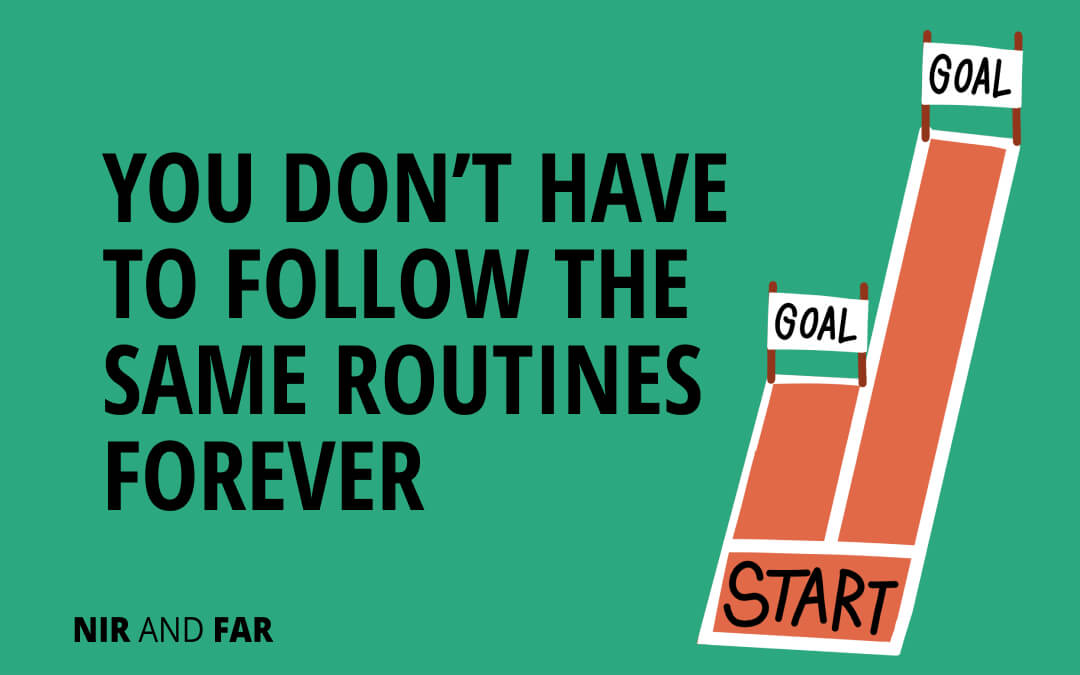Numerous articles detail the routines of the most successful people in the world: Apple CEO Tim Cook wakes up at 3:45 a.m. and exercises. Actor and producer Reese Witherspoon eats the same healthy breakfast every day. Oprah meditates early. Author Tim Ferriss journals daily.
Society has become so focused on productivity hacks and packing the most into every day that we think of long-term, consistent routines as the gold standard for spending our time.
And, yes, long-term routines are helpful for increasing efficiency, decreasing stress and decision fatigue, freeing up cognitive resources, and helping us stay healthy.
But short-term routines come with their own set of benefits. A routine doesn’t have to last forever to serve you well.
Here’s a case for embracing short-term routines.
The Benefits of Short-Term Routines
After four years of research for my book, Indistractable, I struggled to sit down and write the thing. Working from home, I found it all too easy to get off track when I should have been writing.
So, I asked my friend Taylor, a fellow author, to co-work with me. Most mornings, we sat at adjacent desks in my home office and worked in timed sprints of 45 minutes. It was just the accountability I needed to focus.
But after several months, Taylor and I ended our routine because I had completed a first draft and was ready to turn my time and attention to something else.
A routine can be short-term and still serve a purpose.
They Help Us Determine Our Values
If you ask me, success is about more than just personal growth and optimized productivity. It’s about living by our values, or attributes of the person we want to be, which means making time for the activities that match our values.
And, as there are often not enough hours in the day, we must prioritize our list of values. Experimenting with short-term routines helps us determine which values are most important to us and whether an activity reflects them. We can drop misaligned short-term routines and hang on to relevant ones.
That also helps our routines to evolve along with us as our lives change. A routine that worked for you 10 years ago may not apply to your environment and values now. Studies show that our personality changes as we age, evolving with our experiences.
We can use short-term routines to explore what’s most important to us at various life stages.
Temporary Routines Satisfy Temporary Needs
We don’t need to do something ad infinitum for it to be beneficial. A short-term routine can be just what you need at the time.
If you’re going through a rough time, for example, you might find implementing a morning brain dump into a journal a comforting routine. Maybe you’ll stop the routine when you are feeling better. Many people pick up expressive writing during high stress and set it aside once the practice has improved their mental health.
One freelancer wrote that she goes to bed at 8:30 p.m. and wakes up at 5 a.m. because she can finish loads of work by 8 a.m. It’s a routine she implements only when she’s overwhelmed with deadlines, as it also means she sacrifices social events in the evenings.
They Help Us Build Long-Term Routines and Goals
When people set long-term goals, they often fail. But you can achieve significant goals by starting with a short-term routine.
My friend who wanted to build a fitness routine signed up for a 30-day challenge at a gym and pushed herself to take as many classes as possible. The challenge proved to her that even when she was busy, she could make time for exercise if she prioritized the value of being fit. By consistently working out for a month, she became stronger and learned to enjoy her workouts.
After the challenge, she decreased the number of her workouts slightly and turned the short-term routine into a sustainable fitness practice.
They Satisfy Our Thirst for Novelty
Short-term routines fulfill our penchant for perpetually seeking novelty.
A 2016 study suggests that novelty is a fourth psychological nutrient of self-determination theory, which says that to be intrinsically motivated, people must meet their basic psychological needs of autonomy, competence, and relatedness.
Another study found that seeking novelty helps people gather information about, interact with, and interpret the world. By experimenting with short-term routines, we step outside the box and become more expansive.
They Foster Creativity and New Skills
During the COVID-19 pandemic, many of us found new routines to replace old ones that didn’t fit into our new reality. In a 2020 survey of more than a thousand people, 92 percent reported picking up a new skill while quarantined, and 57 percent did it just for personal fulfillment.
The time trapped indoors was a boon for creativity and online learning. The top three skills people developed were cooking and baking, arts and crafts, and personal fitness. Even if indulging our creativity was just a short-term routine, it enabled us to cope with an unprecedented global event, and we picked up new skills in the process.
The Indistractable Tool That Helps You Adopt Short-Term Routines
Long-term routines, like exercising at the same time every morning, may become so foundational to your day that they become habits. You might turn off your alarm, get out of bed, and pull on workout clothes without thinking about it.
Short-term routines must be more intentionally adopted and may never become habits.
Implement and manage a short-term routine using timeboxing, a fantastic time-management technique designed to help you live out your values by scheduling them in a calendar.
Just as short-term routines are not about productivity alone, timeboxing is not focused on measuring outcomes or maximizing productivity by squeezing as many tasks into a day as possible. It’s about doing values-based tasks when you say you would, no matter how much progress you make.
Create and iterate a timeboxed calendar to reflect your values and shifting routines. Before the week begins, set aside 15 minutes to review your schedule for the upcoming week and decide to continue a short-term routine or phase it out if it’s no longer satisfying a value.
Experimenting with short-term routines has myriad benefits, including satisfying our need for novelty, boosting our skills and creativity, and helping us grow and learn more about ourselves. Use my free scheduler maker and habit tracker to give timeboxing and short-term routines a try.
Free Schedule Maker Template
Take back control of your time and design your ideal day.
Your email address is safe. I don't do the spam thing. Unsubscribe anytime. Privacy Policy.

Related Articles
- Schedule Maker: a Google Sheet to Plan Your Week
- Habit Tracker Template in Google Sheets
- The Ultimate Core Values List: Your Guide to Personal Growth
- Timeboxing: Why It Works and How to Get Started in 2024
- An Illustrated Guide to the 4 Types of Liars
- Hyperbolic Discounting: Why You Make Terrible Life Choices
- Happiness Hack: This One Ritual Made Me Much Happier

